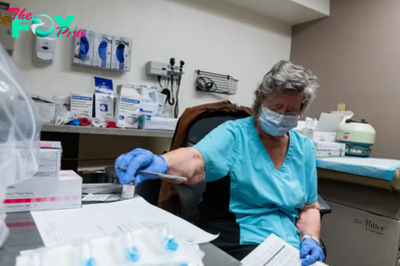Health
A Colorado board wants to lower prescription drug costs. Why are so many patients opposed?
The girl loves to move — cycling and snowshoeing and swimming — but when seizures grip her body, the movement stops.
Her heart rate soars above 170 beats per minute and her blood oxygen level plunges below 70%. She gasps for air. She hunches forward.
And when the seizure cluster finally ends, sometimes many minutes after it began, she looks over to her mother, kneeling beside her, and whispers, “Mommy. Scary. Scary.”
Heather Kluck, who lives in Colorado Springs, calls her 12-year-old daughter, Avery, “my miracle child.” When Avery was diagnosed as an infant with a rare genetic condition called Aicardi syndrome, doctors told Heather and her husband that Avery may not survive her first year and would likely never walk or talk. She defied those predictions, though she has significant developmental delays.
But the miracle is fragile, and the seizures, which have been getting worse as she nears her teen years, could end it. To help quiet the seizures, doctors have recommended that Avery start on a drug called Sabril, a powerful anticonvulsant that can cost as much as $10,000 per month.
Because of that extraordinary price, Sabril is on the radar of a Colorado board seeking to control the cost of prescription drugs. The Prescription Drug Affordability Board, or PDAB, reviews whether drugs are unaffordable and has the ability to set caps on what patients and insurers have to pay for them.
To Kluck, though, this could be a curse to patients. If the caps cause pharmaceutical companies to pull their drugs from Colorado — something at least one company has already threatened — or causes pharmacists to stop stocking them, then patients like Avery might end up harmed.
And, so, Avery has not yet started taking the drug that may save her life. Kluck worries: What if she begins and then we can’t get it anymore? What would happen if Avery had to quickly stop a drug that is notably dangerous to wean off?
“We’re to a point now where her seizures are getting more violent, and this is our last resort,” Kluck said. “And now I’m finding out she may not have access to it.”
☀️ READ MORE
U.S. 50 bridge closure is an “immediate 911 deal” for Gunnison Valley Hospital
“Competency dockets” at Colorado courts are linking people with mental illness to community-based services
Bird flu detected in Colorado dairy herd, widening nationwide outbreak among cattle
Surprising opponents
Colorado lawmakers created the PDAB three years ago to address a persistent problem: A big chunk of Coloradans aren’t taking their medicines because they can’t afford to.
The most recent edition of the Colorado Health Institute’s Colorado Health Access Survey found that nearly 11% of people in 2023 did not fill a prescription because of cost. That number has remained more or less unchanged since the survey began in 2009.
“The original goal of the PDAB is to increase access to drugs,” said Hope Stonner, a policy coordinator at the Colorado Consumer Health Initiative, which supports the PDAB. “Folks aren’t taking drugs because of cost.”

There are a handful of states that have created PDABs to address rising drug costs, but Colorado’s may be the furthest along. Last year, the board began conducting reviews of specific drugs to determine whether they are unaffordable — a task made all the more difficult because some patients may pay very little for a drug and others, especially those who are uninsured, may pay a huge amount for the same drug.
If the board does declare a drug unaffordable, it can then move to set a so-called upper payment limit, which would cap how much patients and insurers have to pay for a drug — and effectively limit how much a manufacturer or a pharmacist can charge. No PDAB in the U.S. has ever done this, but Colorado’s is currently debating whether to become the first to set a price cap, on the arthritis drug Enbrel.
Pharmaceutical companies are opposed to the PDAB. Enbrel’s maker, Amgen, sued Colorado this year to strike down the PDAB’s authority.
But people who suffer from rare diseases — or, like Kluck, care for those who do — surprisingly have emerged as some of the most passionate opponents of the PDAB’s work. They are not opposed to the idea of the PDAB, they say, and they are not defending the price of their drugs. Instead, they say the PDAB has brought stress into lives already full of it.

Their concerns center on the potential unintended consequences of the PDAB’s actions. Would their drugs become unavailable? Would manufacturer assistance programs that many patients rely on to pay for their drugs dry up?
“It’s an experiment, and it’s really gross that they’re doing it on people who are really sick,” said Jennifer Reinhardt, a Littleton mother whose daughter lives with cystic fibrosis and relies on the drug Trikafta.
The stress of uncertainty
Last year, the PDAB considered whether to declare Trikafta unaffordable, and members of the cystic fibrosis community organized in force to tell the PDAB not to.
-

 Health40m ago
Health40m agoDoctor’s bills often come with sticker shock for patients − but health insurance could be reinvented to provide costs upfront
-

 Health15h ago
Health15h agoWhat an HPV Diagnosis Really Means
-

 Health21h ago
Health21h agoThere’s an E. Coli Outbreak in Organic Carrots
-

 Health1d ago
Health1d agoCOVID-19’s Surprising Effect on Cancer
-

 Health2d ago
Health2d agoWhat to Know About How Lupus Affects Weight
-

 Health5d ago
Health5d agoPeople Aren’t Sure About Having Kids. She Helps Them Decide
-

 Health5d ago
Health5d agoFYI: People Don’t Like When You Abbreviate Texts
-

 Health5d ago
Health5d agoKnee problems tend to flare up as you age – an orthopedic specialist explains available treatment options



























